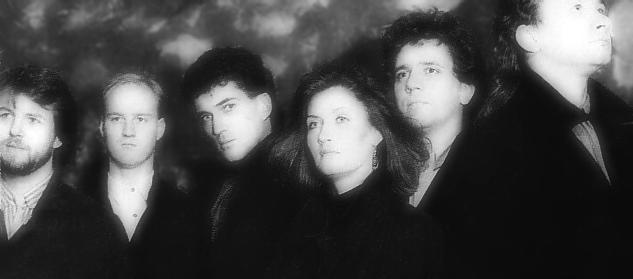
Capercaillie
my favourite Scottish group

The gifted and skillful band, Capercaillie, are at the forefront of modern Scottish Folk music and have indeed achieved a widespread and deserved popularity. I say deserved because, until perhaps recently, they had not compromised their roots to suit the demands of modern popular music consumption. Although their music has now become highly well produced and marketed, in keeping with the commercial pop industry, it remained with a distinctively Celtic sound through several releases, aided no doubt by the fiddle playing input of Charlie McKerron and the whistle-playing of Marc Duff (It seems to me that while Irish music is primarily fiddle-led, Scottish music is distinctively more wind-instrument biassed, together with the harp of course). Donald Shaw also deserves a mention for his thoughtful synthesizer support. Capercaillie's music was often so enriched by very Celtic-sounding chordal arrangements, bringing a strong sense of the Highlands into the listener's ear. At the centre of the band though is the lead vocalist, Karen Matheson, who has a truly beautiful and full voice, all the more beautiful when she sings in Gaelic. Anyone who needs convincing of the beauty of the Gaelic language, both in written and spoken form, need go no further than Capercaillie.
Of Capercaillie's recorded output, the CD Delirium (1991) (Survival ZD 75113) is perhaps the best example, by a whisker. Their inventiveness seemed to have peaked at that point - the CD contains several classic tracks. The gaelic tracks, Rann Na Mòna, Aodann Srath Bhàin, Dean Sàor an Spiòrad and especially the haunting Breisleach are all brilliant, conjuring up images of the Celtic homelands. Furthermore, Coisich a Rùin is a rare example of a traditional gaelic song being made into a successful pop record. The final track, Servant to the Slave has an epic quality about it, while the anthem Waiting for the Wheel to Turn is a memorable rhythmical piece, but is actually far, far better in its remixed version on Get Out (c. 1992), an excellent collection of live and remixed tracks.
The earlier release, Sidewaulk (1989) (Green Linnet, GLCD 1094) sees Capercaillie at their more traditional best. This collection includes a version of Dick Gaughan's great song Both Sides the Tweed and a very haunting heartaching lament for the Scottish homeland, Oh Mo Dhùthaich. Another good source of early Capercaillie is the rereleased and expanded collection The Blood is Strong (1988, 1995) (Survival SURCD 014).
More recently, Capercaillie have been becoming a bit too commercialised for the likes of most traditionalists. Nevertheless, a recent release To the Moon (1995) (Survival SURCD 019) is remarkably good, the songs inventive and well worth hearing, albeit lacking some of the intrinsic Celticness of their earlier sound.
Their most recent release, Beautiful Wasteland (1997) picks up where To the Moon left off, broadening their horizons and moving ever more into the commercial music world. I'm a bit disappointed with this release. A lack of any really good songs is the main problem. In this sense it's a very poor follow-up to To the Moon. But the extra backing vocals from Sibeba, and some really dynamic Uilleann Pipe riffs are first-rate highlights. So, buy it if you already have and like the earlier albums. Otherwise, most of their earlier stuff is better, and I greatly lament the arrival of a Capercaillie album which has almost no trace left of a Scottish-Celtic heritage. This album was recorded in Spain - what inspiration could they possibly have hoped to have gained there? Just shows what damage lapping up modern culture can do.
A beautiful example of the poetry of the Gaelic language, as performed by Capercaillie, is reproduced below:
Breisleach
Chaidh mi 'n-dè choille challtainn
shireadh chnòthan airson biadh
ach 's e bh'air a h-uile geug ach
d'aodann-sa gam thriall
chaidh mi 'n-dè gu tràigh a' mhaoraich
lòn de choilleagan a bhuain
nochd a h-uile slige neamhnaid
d'àilleachd-sa a luaidh
Chaidh mi staigh dhan aon taigh-òsda
son do sgiùrsadh as mo cheann
h-uile glainne thog mi thaom do
mhaiseachd aist' na deann
chlaon mi tràth a-raoir dhan leabaidh
thusa ruagadh as le suain
ach cha tug thu cead dhomh cadal
gus an dèanainn duan
Dh'iarrainn-sa bhith saor od thòireadh
ach gu bheil sinn roinnt o chèil'
do chumadh bhith an àit' do shamhla
agam bhios an fhèill
dh'fhàg thu mi 'nam bhaothair gòrach
bòdhradh chàirdean le do chliù
nuair a thig thu chì iad nach eil
mearachd ann am fhiù
Chì iad sgurr a' danns le saobh-shruth
famh is iolair' anns an ruidhl'
stamh gu caomh ag aitram sùbh-làir
mireadh mu an sùil
chì iad mis' is thusa sùgradh
bil ri bil ar n-anail aoint'
cniadachadh mar seo gu sìor le
chèile b'e ar maoin
Visit Capercaillie on the Web at Capercaillie